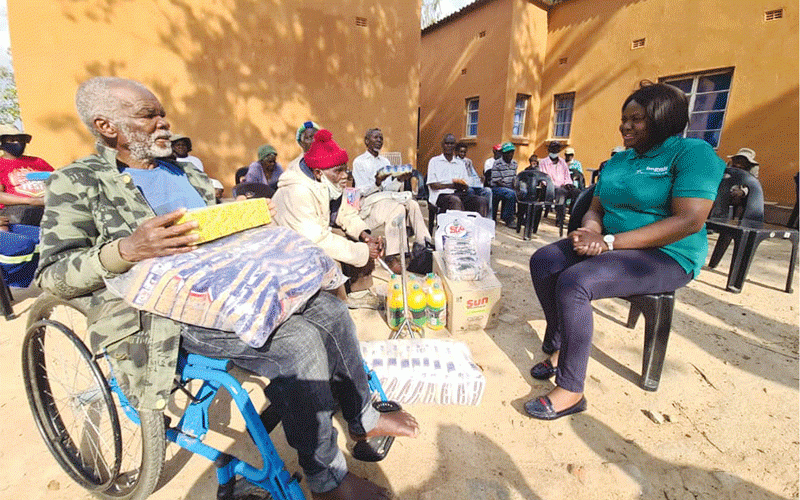
At his house in Mabvuku, a high-density suburb in Harare, Tinago Murape (86) claims his grandchildren starve him.
Not only that, but Murape, who now walks with the support of a walking stick, said his three grandchildren who are adults with their wives and children live in his house and accuse him of bewitching them.
Murape’s wife, Sekai, born in 1941, died two years ago after she contracted COVID-19.
All his three children, succumbed to Aids decades ago, Murape told IPS as he tapped on the ground with his walking stick.
Faced with joblessness and leading lives as domestic part-time workers in the affluent suburbs of Harare, his grandchildren believe their grandfather cast spells on them, resulting in their failure to obtaining formal jobs even though they are educated.
According to Murape, the grandsons and their wives have reportedly slapped him with sanctions — denying him food as a way of punishing him for causing their economic misery,
The grandchildren vehemently deny the accusations.
“That’s not true. It’s old age pushing him to think like that,” one of the grandchildren says.
- Call for recognition of unpaid care, domestic work
- Chinese company accused of unfair labour practices
- Feature: Aged people haunted by abuse in Zim
- ZCTU and ILO turn blind eye to pensioners’ plight
Keep Reading
Yet, Murape states that the abuse has gone on for years, claiming that well-wishers and neighbours often fed and clothed him.
The three grandsons Richard (27), Benito (29) and Tamai (32), have never been formally employed after they completed their technical courses at Harare Polytechnic College.
According to the Zimbabwe Congress of Trade Unions, 90% of Zimbabweans are unemployed.
Murape’s grandsons are part of the country’s unemployed, although they believe in witchcraft,
HelpAge Zimbabwe director Priscilla Gavi says: “Older people are wrongly accused of practising witchcraft, which sees them blamed for deaths, drought, floods, disease and other calamities.”
In some instances, says Gavi, older people are victims of community ill-treatment that may be fatal or leave them with disabilities or dead.
But Murape says he has learnt to endure the abuse.
“Sometimes they shut me out of my house on top of denying me food, knowing I have no source of income and well-wishers have become my saviours every day,” Murape says.
With many aged Zimbabwean citizens like Murape putting up with abuse, the rate at which senior citizens are abused has become a trend.
In 2021 alone, police in Zimbabwe claimed they handled 900 cases countrywide related to the abuse of aged persons.
Like Murape, many aged people in Zimbabwe are taken care of by relatives and they claim they have become victims of physical and emotional abuse, with some claiming even to have been sexually abused.
Aged rape victims are many, like Agness Murambiwa (76) in Harare, who claimed her grandson (22) raped her before he fled to South Africa earlier this year.
Gavi says aged persons are not spared from sexual abuse.
“Cases of rape of older women by much younger men are increasing in parts of Zimbabwe. In some instances, these arise from the mistaken notion that having sex with an older woman can cure one of terminal illnesses,” Gavi says.
But the wounds remain for Zimbabwe’s aged rape victims like Murambiwa.
“Earlier this year, Themba, my grandson, attacked me while I slept in my bedroom and threatened to kill me if I made any noise before he raped me. It pains me that my blood did this to me,” Murambiwa tells IPS.
Murambiwa is taken care of by her two daughters, both of whom divorced their husbands and one of whom is Themba’s mother.
The daughters claim they are strained taking care of their aged mother.
“It’s not easy looking after an aged parent. We have limited resources, and she always complains that we are not doing enough, yet none of us are employed. We are vendors living from hand to mouth,” 52-year-old Letiwe, one of Murambiwa’s daughters, tells IPS.
But many aged Zimbabweans like Murape and Murambiwa say they cannot fight off their abusers because they are in desperate need of care.
With limited resources to support its senior citizens, Zimbabwe has no social grants for the aged.
This means aged people like Murape and Murambiwa are on their own as they bear the brunt of abuse in the twilight of their lives.
The Constitution protects the elderly, defined in section 82 of the Constitution as people over 70.
Many of Zimbabwe’s aged citizens have no money after the 2008 hyperinflation eroded their savings.
This time, a new round of inflation has not helped the country’s growing number of abused aged people who depend on their relatives.
Inflation currently hovers above 257% in Zimbabwe, with food prices skyrocketing, meaning the lives of aged people such as Murape could even worsen.
Other than inflation, for aged men — widowers that have remarried, according to HelpAge’s Gavi, abuse could be even worse.
“Some older men have also faced abuse from their younger wives who mistreat their spouses, leading to some of these men finding themselves on the streets,” said Gavi.







